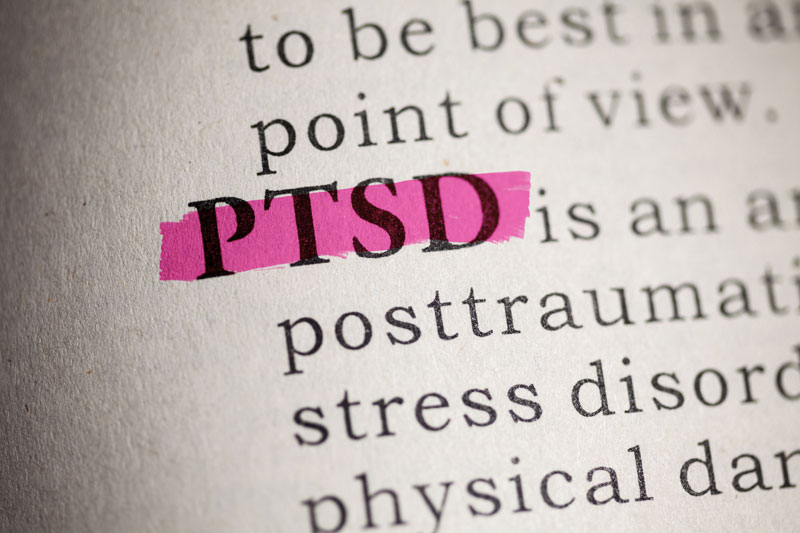Posttraumatic stress disorder, or PTSD, is a condition that can develop after someone has experienced a traumatic event. The symptoms of PTSD can be very disruptive and may cause people to struggle with their everyday lives. In this blog post, we will discuss some of the common side effects of PTSD. If you are struggling with PTSD, it is important to seek help from a qualified professional. There are many resources available to you!
Contents
Defining PTSD
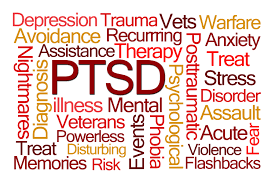 PTSD, a popular acronym for post-traumatic stress disorder, is a medical condition that may develop after an individual experiences or witnesses a traumatic event. The American Psychiatric Association’s Diagnostic and Statistical Manual of Mental Disorders-Fifth Edition (DSM-V) outlines the specific criteria needed for PTSD diagnosis which includes signs and symptoms in four symptom clusters:
PTSD, a popular acronym for post-traumatic stress disorder, is a medical condition that may develop after an individual experiences or witnesses a traumatic event. The American Psychiatric Association’s Diagnostic and Statistical Manual of Mental Disorders-Fifth Edition (DSM-V) outlines the specific criteria needed for PTSD diagnosis which includes signs and symptoms in four symptom clusters:
- Re-experiencing the traumatic event(s) through intrusive thoughts, flashbacks, and nightmares.
- Avoidance of people, places, things, and situations that remind them of the trauma.
- Negative changes in mood and thinking including feeling isolated, hopelessness, worry, anger, and difficulty concentrating.
- Changes in physical and emotional reactions like being easily startled, feeling on edge, and sleeping problems.
It is important to note that not everyone who experiences a traumatic event will develop PTSD. It is estimated that about 8% of the population will experience PTSD at some point in their lives while only about four percent of the population will have PTSD in any given year.
Side Effects Of PTSD
It is a rather obvious fact that the side effects of PTSD can be extremely debilitating, making it hard for individuals to lead normal lives. The side effects and consequences can range from mild to severe and can last for a period of days, weeks, or even years. Here are some common side effects of PTSD.
Physical
Our brain and body co-exist and are interconnected. When our brain is experiencing trauma, our body reacts physically as well. It is not uncommon for individuals with PTSD to experience a variety of physical after effects such as:
- Chronic pain
- Digestive problems
- Headaches
- Chronic stress
- Fatigue
- Sleep problems
- High blood pressure
- Problems with vision and hearing
- Weight gain or weight loss
These are just a few examples of the physical side effects of PTSD. If left unchecked, these may further cause severe physiological conditions such as:
- Cardiovascular disease
- Obesity
- Type II diabetes
- Hypertension
- Insomnia
- Stroke
- Autoimmune diseases
- Cancer
- IBS (irritable bowel syndrome)
- Fibromyalgia
All these conditions are dangerous with their own set of side effects. Therefore, it is important to be aware of the physical symptoms of PTSD and to seek help.
Psychological
Psychological disorders are very complex and interrelated. Many times, it is hard to determine which came first: the psychological disorder or the PTSD. Regardless, it is not uncommon for individuals with PTSD to experience the following psychological disorders:
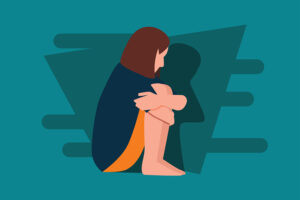
- Anxiety disorders
- Agoraphobia
- Anger issues
- Depression
- Personality disorders
- Obsessive-compulsive disorder (OCD)
- Substance abuse
PTSD can also lead to substance abuse and addiction as individuals self-medicate in an attempt to numb the pain. It is important to seek help if you or someone you know is struggling with PTSD
Emotional
PTSD not only affects our physical health but also our emotional well-being. Those struggling with trauma often experience:
- Anxious thoughts
- Guilt
- Shame
- Self-blame
- Sadness
- Irritability
- Remorse
- Worthlessness
- Mood swings
- Anger
- Isolation
It isn’t uncommon for individuals with PTSD to become depressed or develop other mental health conditions.
Cognitive
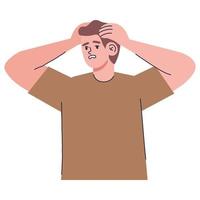 Cognition is described as the mental process and activities associated with thinking, knowing, remembering, and judging. When an individual has PTSD, their cognition is often affected. They may experience:
Cognition is described as the mental process and activities associated with thinking, knowing, remembering, and judging. When an individual has PTSD, their cognition is often affected. They may experience:
- Memory problems
- Trouble concentrating
- Poor concentration
- Inability to multitask
- Poor concentration
- Poor decision-making skills
- Racing thoughts
- Hopelessness
- Pessimism
These cognitive symptoms of PTSD can make it hard for individuals to function in their daily lives.
Social
Lastly, social life is a component that is often affected by PTSD. As humans, we are social creatures that need connection and intimacy. The side effects of PTSD on social life can include:
- Withdrawal from friends and family
- Loss of interest in activities that were once enjoyed
- Trouble at work or school
- Avoidance of social gatherings
- Isolation
- Abandoning hobbies and activities that were once enjoyed
- Intimacy problems
- Difficulty maintaining relationships
PTSD can be extremely isolating, making it hard for individuals to connect with others. This is one of the most difficult aspects of PTSD.
These are just a few examples of the side effects of PTSD. It is important to be aware of the signs and symptoms so you can seek help if necessary. If you or someone you know is struggling with PTSD, there are many resources available to help. Don’t suffer in silence, reach out for help today.
Ways To Manage PTSD Side Effects
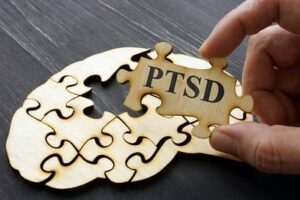 Now that we are more aware of the different side effects of PTSD, let’s discuss some ways to manage them.
Now that we are more aware of the different side effects of PTSD, let’s discuss some ways to manage them.
One of the best things you can do is to develop a support system. This can be family, friends, co-workers, or anyone else you feel comfortable talking to. These people can provide a listening ear and help offer suggestions on how to better cope with your side effects. It is also important to find healthy coping mechanisms. This looks different for everyone but some examples include:
- Exercise
- Yoga
- Meditation
- Breathing exercises
- Mindfulness
- Journaling
- Spending time in nature
- Listening to music
Everyone copes differently, so it is important to find what works best for you. The most important thing is to avoid using unhealthy coping mechanisms such as alcohol or drugs.
If you feel like the consequences are getting too difficult to manage on your own, there are many professionals who can help. Therapists, counselors, and psychiatrists can all provide treatment for PTSD. They can help you understand your thoughts and feelings and teach you healthy coping mechanisms. Some of the most common treatments for PTSD include:
- Cognitive-behavioral therapy (CBT)
- Prolonged exposure therapy (PE)
- Eye movement desensitization and reprocessing therapy (EMDR)
- Hypnosis therapy
- Expressive art therapy
- Medication
PTSD can be a difficult journey but you don’t have to go through it alone. There are many resources and people available to help you cope with the side effects of PTSD. Don’t suffer in silence, reach out for help today.
Conclusion
In conclusion of the above, PTSD side effects are many and varied, and can be extremely debilitating. It is important to be aware of the signs and symptoms so you can seek help if necessary. There are many ways to manage the side effects of PTSD, both on your own and with professional help. If you or someone you know is struggling with PTSD, don’t suffer in silence, reach out for help. You deserve a life free of the burden of PTSD.
If you or someone you know is struggling with depression, Therapy Mantra is here for you. We are the leading providers for online therapy and counseling. Our team of highly trained and experienced therapists can help you work through your depression. Contact us today to learn more about our services. You may also visit our website to book an online therapy session or download our free Android or iOS app for more information.
